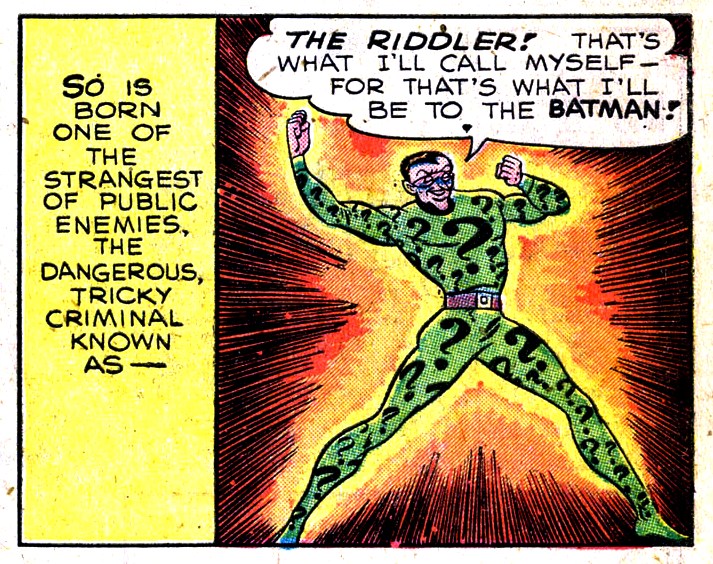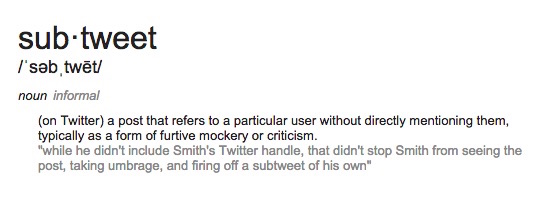The Riddler was the Original Subtweeter
The ‘Fallacy of the Talking Killer,’ as Roger Ebert once put it, has been the downfall of many an inspired ne’er-do-well. Instead of just killing the hero/pushing the big red button/hopping in the getaway car, the bad guy lets their ego get in the way of their flawless plan and rats foiled again.
However, there’s one villain in particular who doesn’t just orate defeat from the clutches of victory, but who’s psychologically compelled to leave clues for all to bear witness to — manifestations of his perceived intellectual superiority over his would-be captors — almost exclusively to his own detriment.
Edward Nashton#, aka Edward Nygma, aka The Riddler…

And its his legacy that lives on in this new world of subtweeting.
But to backtrack a bit…

Subtweeting, for those with better things to do not in the know, is a popular activity among Twitter users in which the composer of a tweet will intentionally not use the @ mention symbol when writing something (usually derisive) about another user# so that said subject of said message isn’t alerted. Essentially, it’s talking shit behind someone’s back, except instead of it just being to a mutual friend or a trustworthy coworker, it’s to the entire universe. Think of it like leaving the world’s worst clue and writing it in digital ink for all eternity.
Not only is it a pretty dick move, but you have to be an idiot to think you’re not going to get caught, as The Riddler was every time, making it that much worse in the long run.
Yet Future is still subtweeting Ciara and Hillary is still subtweeting Jeb Bush. It’s like they didn’t even read Salon’s so-tortuously-Salony takedown on this ‘cancer of American discourse’:
The subtweet is Twitter’s answer to passive-aggression, which remains the great cancer of American discourse. Once you peel away the derisive snub, the subtweet ultimately reveals that the person not being explicitly referenced really matters.
Even The Riddler himself understood the fatal flaw with this gimmick.
In Batman Vol. 1 #179‘s “The Riddle-Less Robberies of The Riddler,” Nygma realizes that this quirk of his is actually a compulsion — he can’t help but leave clues, even subconsciously — and in Batman: Gotham Adventures #11, he shatters when he becomes cognizant to the fact that he’s a slave to his own hubris: “You don’t understand… I really didn’t want to leave you any clues. I really planned never to go back to Arkham Asylum. But I left you a clue anyway. So I… I have to go back there. Because I might need help. I… I might actually be crazy.”
That’s the thing about subtweeting though. For a fleeting few minutes, it feels so good when you hit the ‘Tweet’ button. You’ve shared your message with the world (-1 individual) and what was once trapped inside is now free to travel the vast digital highways of the interweb.
But then this seed of panic and dread begins to sprout. What happens when the shit-talked finds out about your shit-talking? There’s now even a site called SubtweetFinder that (semi-accurately) helps one figure out who the subject a particular subtweet is. You start to realize this might not have been worth it in the long haul of things, because now you just seem like a coward at best and an asshole at worst. Then the room starts spinning…
On August 9th, 2010, “subtweet” was first added to Urban Dictionary#, and approximately a week later #subtweet was added to the Twitter hashtag database Tagdef, which means for at least 5 years we’ve been writing things like this:
The hype machine has ruined an entire generation of music writers. Just had to remind a 20-year-old that every song can't be "mind blowing."
— Bryce Taylor Rudow (@brycetrudow) August 5, 2015
without mentioning that 20-year old who definitely follows you and knows you were talking about them
and this:
@marcuskdowling Oh hey, that column looks familiar. Only slightly different…
— Bryce Taylor Rudow (@brycetrudow) August 12, 2015
without tagging the editor who took the column Marcus tweeted about away from you once your fancy new website Random Nerds started.
But there’s hope. Recently, in the comics, a semi-reformed Edward Nygma actually begins helping Batman solve the more befuddling of clues the Dark Knight comes across in his detectivial pursuits. And to paraphrase a famous fictional boxer, if I can change, and The Riddler can change, then we can all change. We don’t have to be slaves to our inner, twisted compulsions any longer.
We can rise above them…
#DeshiBasara
Like what you read? Share it.
(That helps us.)
Love what you read? Patronize Bryce Rudow.
That helps us and the writer.
What is Patronizing? Learn more here.

